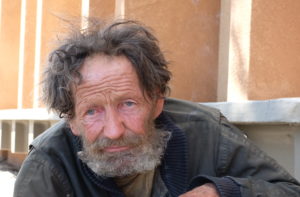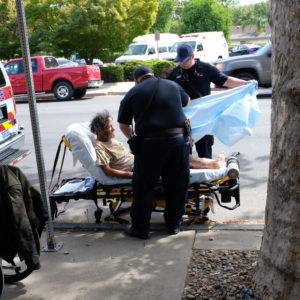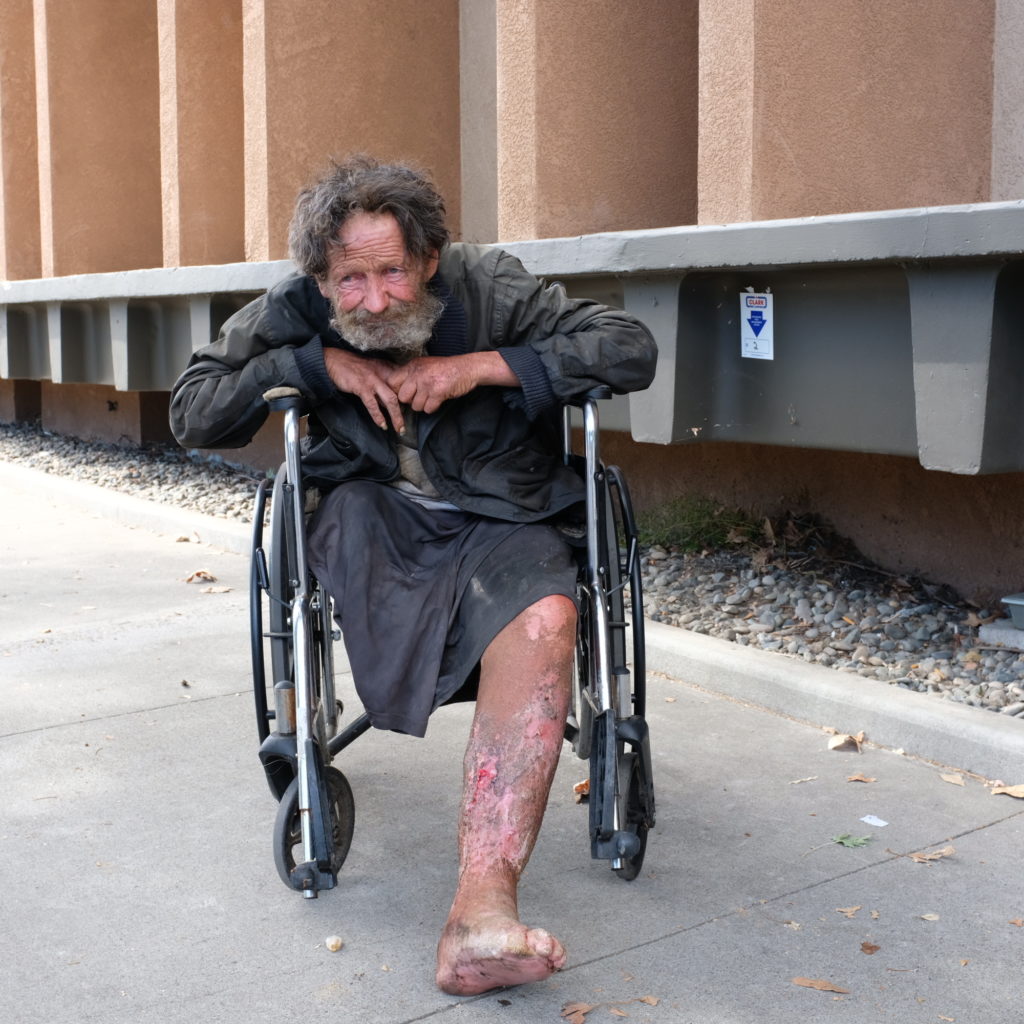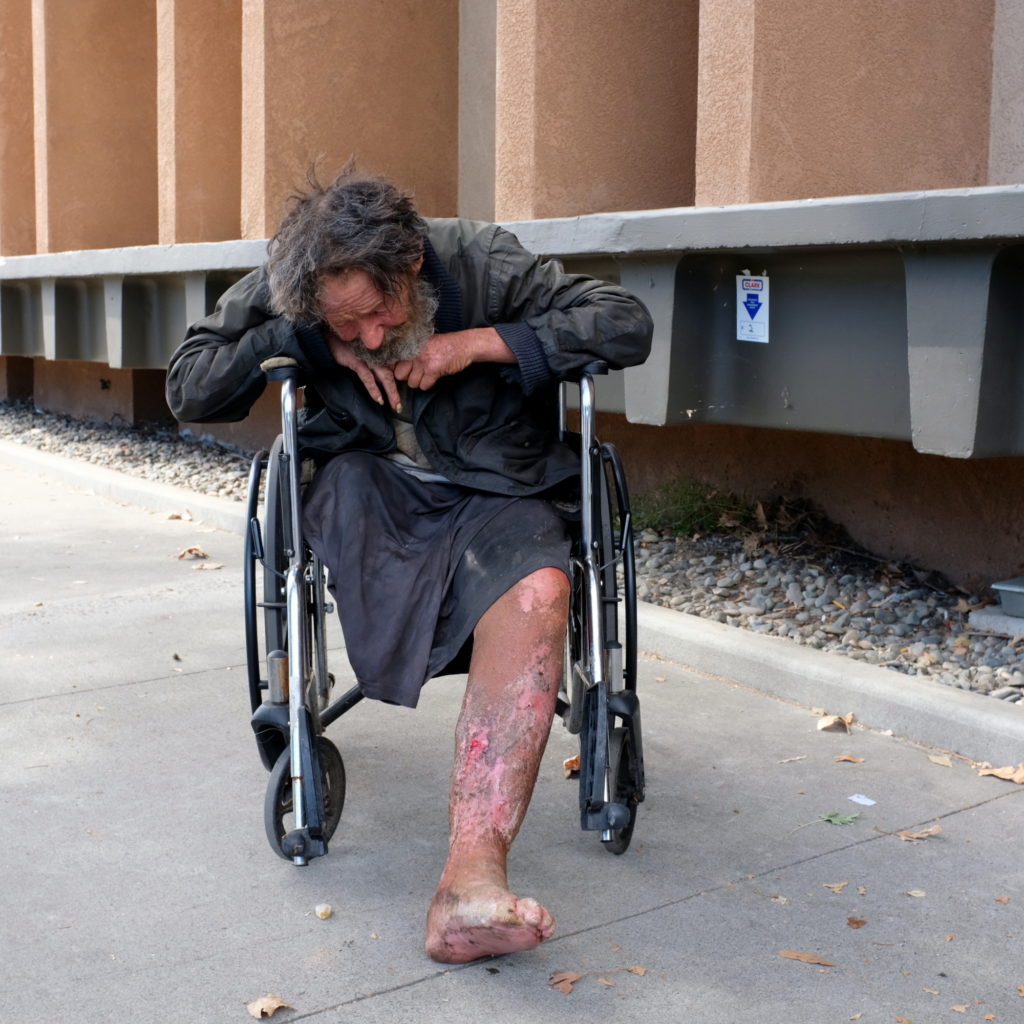
Homeless outreach worker Randy Limburg came across Alan Davis a couple of weeks ago. Davis was frequenting downtown Modesto in an area roughly from the old Modesto Bee building, at 1325 H Street, to five points at J Street and Downey Avenue, near Ralston Towers.
Davis said he was fifty-four years old and had been on the streets for a few months after waking up from surgery at Memorial Hospital. He wasn’t sure why he’d had the surgery in Modesto because he was from Sacramento, where he’d been homeless, “around twenty years,” in the downtown area of North Highlands.
Davis told Limburg he’d left Memorial Hospital after having his right leg and one toe on his left foot amputated with, “no place to go,” so he came downtown. Like many homeless people, Davis refused help.
Worried because Davis had no money, couldn’t stand or walk, and tended to stay away from people, Limburg tried to keep an eye out for the one-legged man in the wheelchair. When he encountered Davis a second time, Limburg saw that the man’s left leg was horribly scabbed and bleeding. Still, Davis refused help.
Concerned that Davis’s condition could only worsen, especially since he had no money or nearby friends or family, Limburg alerted a close circle of volunteers to watch out, “for the guy in the wheelchair with one bad leg.”
Despite his limited range, Davis proved hard to find, even after people started searching for him. Finally, Sunday September 22, a volunteer outreach worker found Davis on G Street, near the Central Valley Specialty Hospital on 17th Street.
The volunteer, who wished to be identified only as, “Frank,” quizzed Davis about his past and learned that Davis had income, but didn’t know where his “Social Security” checks were delivered. Since Davis said he’s only 54 years old, Frank speculated that he was on Disability rather than Social Security, even though Davis insisted he was on the latter.
Like many homeless people, Davis had no wallet or identification. He did claim to know his Social Security number, and, if it’s accurate, it will enable outreach workers to get him much-needed help.
The more he chatted with Davis, the more Frank thought he should be in the hospital. His leg looked bad and Davis seemed to be having memory problems, though those could have been due to dehydration and malnutrition. When offered a bottle of water, Davis downed it almost immediately.
Wanting a second opinion, Frank called another volunteer, a registered nurse. Luckily, the nurse and her husband were nearby. They arrived only a few minutes after Frank’s call.
The nurse quickly determined Alan Davis should be in the hospital, and then exercised the powers of nurse-angels everywhere:
“Look at me,” she said to Davis. “You should be in the hospital where you can be taken care of. Do you understand what I’m saying?” Davis, who by this time was tending to lose focus and drift off, nodded.
“Look at me,” repeated the nurse. “When the ambulance comes, you’re going to go to the hospital. Understand?” Davis nodded.
Obviously worn out after answering questions and encountering more people than usual, Davis began to doze. But by then Frank had learned Davis believed his father was still alive and living in Sacramento. Davis also said he had two sons, both homeless, who also lived in Sacramento.
 The nurse, who also wishes to remain anonymous, couldn’t stay to see Alan Davis loaded onto a gurney when the ambulance arrived, but she was pleased to learn later that he’d obeyed her orders to accept help.
The nurse, who also wishes to remain anonymous, couldn’t stay to see Alan Davis loaded onto a gurney when the ambulance arrived, but she was pleased to learn later that he’d obeyed her orders to accept help.
Both Frank and the nurse know that Davis will have nowhere to go once released by the hospital, but they’re already planning to get him into better circumstances. Frank thinks Davis could at the very least get a tent at Modesto’s Outdoor Emergency Shelter as a starting point toward assisted living.
And if he refuses help, Frank knows he can rely on a persuasive nurse to convince the man in the wheelchair to do the right thing.



Hello my name is Kristi and I’m a single mother with a autistic daughter and we are homeless. Seeing good people out there still caring makes our lonely world a much better place for us.
Thank you Randy for getting Frank to help out Mr. Davis. Thank you Frank for locating him & calling your nurse friend for assistance. Thank you AMR for getting him to the hospital.
And especially thank you Randy for coming when I called you to help him on Friday. Teamwork got the job done!
He could have a payee account at that place downtown near the police station. His checks would be held from the time in hospital til now.That might help him some
Eric,
It’s easy to point out that people like Mr Davis are the result of the decisions he made. I hear that plenty. It gets creepy if we are willing to admit that he is the result of wider decisions we all make on political and economic levels. When people who have no idea who Davis is have in their power to create the world in front of them (voting, democracy), it’s a shame that it takes an assortment of community volunteers just to keep him alive.
JT: Yes, it’s a shame Mr. Davis didn’t “choose” to go to Harvard and enter the world of finance. People who argue life is the result of choices never seem capable of admitting that some people have far different and fewer options than others. I’ve seen kids who literally grew up on the streets and were introduced to hard drugs before they were teenagers. Different set of options than most can imagine. Then we have the mentally ill who “choose” schizophrenia. Bah.
I used to buy him a coffee and food every morning. I also purchased socks for him. Can I please get what hospital he is at and room number. I’d love to pay him a visit. My email is [email protected]. … ❤❤
Hi Tony: Alan now has a tent at the Modesto Outdoor Emergency Shelter. Visitors are okay. His tent his near the service container, so most people will be able to direct you.
Excellent article, Eric! Kudos to the good Samaritans that helped Mr. Davis. And thanks for working to educate the lesser informed in our midst that the world doesn’t present everyone with an even playing field and a locker room full of helpful coaches and teammates (much less a full deck of cards to begin with.) Many of us learned early on that options, opportunities and life decisions are simply not open to many people through no fault of their own, up to and including what choices they are able to make, if they, in fact, even have the capacity to make choices! A civilized society should recognize these inequalities and provide safety nets for the less intellectually endowed, the less fortunate, the tortured souls that so many folks walk by but don’t “see.” We have become a throwaway nation with our plastic straws, styrofoam plates and cups and overuse of fancy, often unnecessary packaging, so we must work to ensure that we don’t start treating human beings with that same sort of “disposable” mentality. We are better than that!